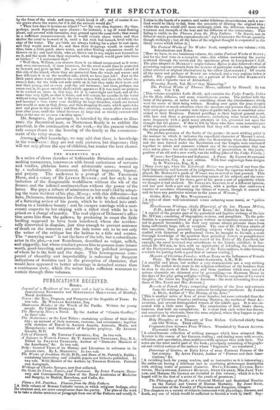THE MARRYING MAN Is a series of clever sketches of
fashionable flirtations and matchmaking manceuvres, interwoven with broad caricatures of servants and toadies, plebeian bores and aristocratic asses ; wound up by a melodramatic denouement, involving imposture, bigamy, and perjury. The authoress is a protege of Mr. THEODORE Moo, and a votary of Sir LYTTON BULWER ; and her style is an imitation of the disagreeable worldliness without the wit of the former, and the inflated sentimentalism without the power of the latter. She pays a tribute of admiration to her soul's idol by adopting the main incident of his play, Money; with this difference—her bero, Delamere, determines his choice of a wife by the critical test of a flattering review of his poem, which he is tricked into attributing to a brainless beauty : and he escapes marriage with a mercenary coquette by her eloping with a titled rival while he is in prison on a charge of murder. The real object of Delamere's affection saves him from the gallows, by producing in court the little lordling supposed to have been murdered, whom she accidentally discovered in disguise, just time enough to prevent sentence of death on the innocent ; and the lady turns out to be not only the writer of the critique but the heiress to a title and estates. The "marrying man" is not the hero of the tale, but a subordinate actor in the plot,—a raw Scotchman, described as vulgar, selfish, and niggardly, but whose conduct proves him to possess more innate worth, good-breeding, and generosity, than the polished intriguers of whom he is the butt and the dupe. This heterogeneous compound of absurdity and improbability is redeemed by frequent indications of feminine tact in the perception of character, that would have appeared to better advantage in detached scenes than a continuous story, which the writer lacks sufficient resources to sustain through three volumes.


























 Previous page
Previous page